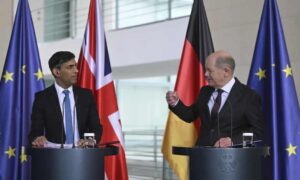
Rishi Sunak has suggested he will not “shy away” from further public spending cuts to boost defence spending as he faced questions over how the policy will be funded.
He said the plan would not affect the government’s ability to cut taxes and was the “right thing to do” in an increasingly dangerous world.
The prime minister has committed to spending 2.5% of GDP on defence by 2030, an increase of more than £75bn over the next six years compared with current levels. However, the government’s numbers have faced scrutiny from economists who have said they will lead to bigger spending cuts in other areas.
Asked at a press conference in Berlin whether his defence increase would mean tax rises and deep cuts, he said that was “not a fair characterisation”.
“We have made a choice and I am not shying away from that choice,” he said. “All governing is about prioritising. I have decided to prioritise defence because I think that is the right thing to do for our country.”
Sunak said investment in the NHS and schools – which along with international development are protected areas – was “not going to change”.
He said the plan, which will cost £4.5bn a year by 2028-29, was fully funded and he has already ruled out any increase in borrowing or debt to pay for it. Of the increase, £1.6bn is to come from a rise in research and development funding for defence, although it is unclear which department will miss out as a result.
The remaining £2.9bn will come from a reduction in the civil service headcount to pre-pandemic levels – a 70,000-person cut. “It is a completely funded plan,” Sunak said. “We have got a very clear idea of how to reduce civil service headcount, which has grown considerably over the last few years … And alongside that, continue to invest in public services and cut people’s taxes.”
Yet the prime minister has faced some scepticism from economists over the cost of the commitment, which will be an additional £4.5bn by 2028-29, taking defence spending from approximately £73.8bn a year to £78.2bn.
Paul Johnson, the director of the Institute for Fiscal Studies, said: “The overall spending ‘envelope’ was set in the budget, and hasn’t been adjusted. With no more spending overall (and no tax rises) that can mean only one thing: bigger spending cuts elsewhere.”
He criticised the government’s numbers as “impenetrable, misleading and internally inconsistent”, suggesting the defence spending claims were “overblown”.
